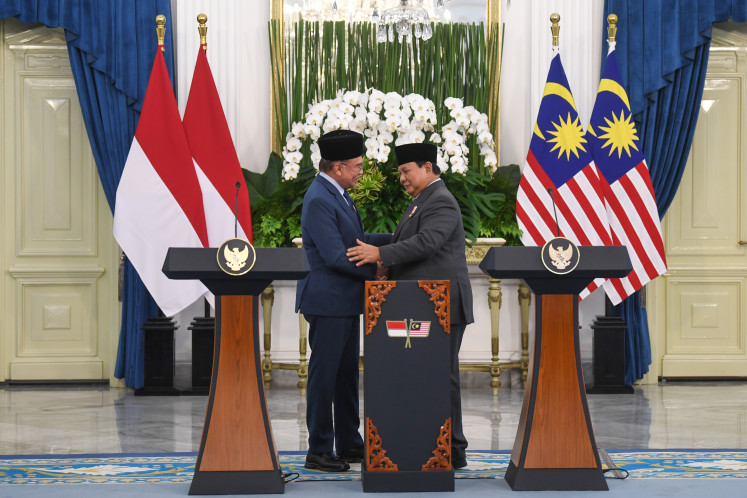Popular Reads
Top Results
Can't find what you're looking for?
View all search resultsPopular Reads
Top Results
Can't find what you're looking for?
View all search resultsBiden’s Israel policy raises questions
Amid the ongoing Palestinian-Israeli conflict, the US navigates a precarious moral and reputational landscape.
Change text size
Gift Premium Articles
to Anyone
F
or months, global voices have clamored for an end to the relentless conflict in Gaza, as Israeli forces clashed with Palestinian factions. After more than 170 days of suffering, the United Nations Security Council's adoption of a ceasefire resolution on March 25 marked a significant milestone.
The bloodshed and devastation endured by Palestinians underscored the urgent need for diplomatic intervention. Now, the resolution must pave the way for substantive peace talks between India and Hamas, with support from regional and international mediators.
While challenges persist, the unified call for a ceasefire signals a potential turning point. Despite the resolution's imperfections, the international community's unified stance offers hope for progress in Gaza. It is a reminder of the power of collective action to bring about positive change in conflict zones.
The recent UN Security Council resolution reflects a global recognition of the pressing need to address the underlying issues fueling the conflict in the region. Despite previous unsuccessful attempts, the resolution signifies a growing consensus among nations to prioritize stability and adherence to international law.
Notably, the abstention of the United States, a longstanding ally of Israel, marks a departure from its traditional stance. While not indicative of a complete policy shift, this move signals a willingness to engage in collaborative efforts to mitigate tensions. Following the passage of the resolution, Linda Thomas-Greenfield, the US representative to the UN, sought to downplay its significance by emphasizing its non-binding nature.
This statement, seemingly aimed at placating Israel, thereby undercutting the efforts of the international community. It shows that the US stance on the Palestinian-Israeli conflict remains largely unchanged, lacking a clear tilt toward peace efforts.
However, mounting pressure for an immediate ceasefire, both globally and domestically within the US, has compelled the US to at least make a symbolic gesture.
The passage of the resolution is being viewed as a triumph for the forces advocating for justice within the international community. It reflects a growing consensus and urgency among nations to address the longstanding conflict and underscores the importance of continued diplomatic efforts to achieve lasting peace in the region.
The UN Security Council resolutions, as enshrined in the UN Charter, are universally binding—a fact underscored by the international legal framework. Despite this clarity, the US permanent representative to the UN's assertion that such resolutions are non-binding remains confounding.
The US's ambiguous stance on this fundamental matter is perplexing and warrants clarification. As a leading member of the international community, the US must adhere to established norms and uphold the authority of UN Security Council resolutions.
Amid the ongoing Palestinian-Israeli conflict, the US navigates a precarious moral and reputational landscape. Disregarding UN resolutions would only deepen this quagmire, inviting global condemnation.
Influential nations must engage actively in resolving the crisis, including supporting resolution implementation. As a key player, the US must lead these efforts, aligning its actions with international norms and upholding the authority of the UN Security Council.
The Gaza crisis has become entangled in the political machinations of the US presidential election, evident in the contrasting approaches of Donald Trump and Joe Biden toward Israel and its defense forces.
While both candidates may pay lip service to resolving the crisis, their true focus seems to lie in leveraging the situation for electoral gain. As the US heads into the general election, the Gaza crisis, despite its severity, may take a back seat to domestic issues.
Yet, its impact on the election is undeniable. Trump and Biden are likely to use their stances on Gaza to appeal to their respective voter bases, employing electoral tactics rather than seeking immediate solutions to the crisis. While the humanitarian tragedy in Gaza should command global attention, the realities of electoral politics often prioritize domestic concerns.
Nonetheless, the Gaza crisis will shape the discourse surrounding the election, serving as a litmus test for candidates' foreign policy priorities and values.
Amidst the escalating tensions in the Palestinian-Israeli conflict, the US stands at a pivotal juncture. It must navigate this delicate situation with a focus on justice and equality to avert a protracted crisis characterized by enduring instability and animosity between the two peoples.
Treating both Palestinians and Israelis with parity is paramount. Any attempt to elevate the political rights of one group over the legitimate rights of the other undermines the prospects for lasting peace in the region.
***
The writer is a freelance columnist on international affairs.











